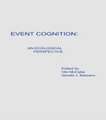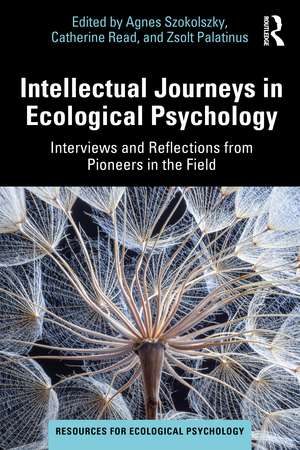Intellectual Journeys in Ecological Psychology: Interviews and Reflections from Pioneers in the Field: Resources for Ecological Psychology Series
Editat de Agnes Szokolszky, Catherine Read, Zsolt Palatinusen Limba Engleză Paperback – 27 dec 2022
Featuring a mix of interviews conducted around the turn of the millennium with leading figures of Ecological Psychology, the book reveals discussions not previously found in publications and authentic personal perspectives about the early days of Ecological Psychology, a significant paradigm of post-cognitivist psychology. The interviews are supplemented by current reflections that bridge the past to the present. Each interview chapter also contains a brief biography of the interviewee and a list of their top ten most significant publications. An introductory chapter by Harry Heft provides an overview of Gibson’s theory and the post-Gibsonian theoretical landscape. A further chapter by the editors highlights lineages and patterns in the scientific careers and work of the interviewees. An epilogue by William Warren concludes the volume, addressing the current state and directions of Ecological Psychology. In the Appendix photographs taken by Sverker Runeson in the 1960s and 1970s show scenes and actors from scientific event in Ecological Psychology.
This book will be beneficial to all researchers and students in the international community of Ecological Psychology. It will also serve as a starting point for those who wish to learn more about the movement and origins of Ecological Psychology.
| Toate formatele și edițiile | Preț | Express |
|---|---|---|
| Paperback (1) | 406.21 lei 22-36 zile | +38.54 lei 6-12 zile |
| Taylor & Francis – 27 dec 2022 | 406.21 lei 22-36 zile | +38.54 lei 6-12 zile |
| Hardback (1) | 698.83 lei 43-57 zile | |
| Taylor & Francis – 27 dec 2022 | 698.83 lei 43-57 zile |
Din seria Resources for Ecological Psychology Series
-
 Preț: 373.49 lei
Preț: 373.49 lei -
 Preț: 293.25 lei
Preț: 293.25 lei - 8%
 Preț: 551.17 lei
Preț: 551.17 lei -
 Preț: 339.79 lei
Preț: 339.79 lei -
 Preț: 355.87 lei
Preț: 355.87 lei -
 Preț: 359.90 lei
Preț: 359.90 lei - 15%
 Preț: 470.05 lei
Preț: 470.05 lei -
 Preț: 357.16 lei
Preț: 357.16 lei -
 Preț: 496.81 lei
Preț: 496.81 lei -
 Preț: 340.85 lei
Preț: 340.85 lei - 15%
 Preț: 507.92 lei
Preț: 507.92 lei -
 Preț: 355.58 lei
Preț: 355.58 lei - 5%
 Preț: 1168.92 lei
Preț: 1168.92 lei - 15%
 Preț: 677.30 lei
Preț: 677.30 lei - 15%
 Preț: 448.78 lei
Preț: 448.78 lei -
 Preț: 449.41 lei
Preț: 449.41 lei -
 Preț: 449.41 lei
Preț: 449.41 lei
Preț: 406.21 lei
Nou
Puncte Express: 609
Preț estimativ în valută:
77.73€ • 81.36$ • 64.69£
77.73€ • 81.36$ • 64.69£
Carte disponibilă
Livrare economică 10-24 martie
Livrare express 22-28 februarie pentru 48.53 lei
Preluare comenzi: 021 569.72.76
Specificații
ISBN-13: 9780367750107
ISBN-10: 0367750104
Pagini: 470
Ilustrații: 1 Tables, black and white; 2 Line drawings, black and white; 29 Halftones, black and white; 31 Illustrations, black and white
Dimensiuni: 156 x 234 x 32 mm
Greutate: 0.87 kg
Ediția:1
Editura: Taylor & Francis
Colecția Routledge
Seria Resources for Ecological Psychology Series
Locul publicării:Oxford, United Kingdom
ISBN-10: 0367750104
Pagini: 470
Ilustrații: 1 Tables, black and white; 2 Line drawings, black and white; 29 Halftones, black and white; 31 Illustrations, black and white
Dimensiuni: 156 x 234 x 32 mm
Greutate: 0.87 kg
Ediția:1
Editura: Taylor & Francis
Colecția Routledge
Seria Resources for Ecological Psychology Series
Locul publicării:Oxford, United Kingdom
Public țintă
PostgraduateCuprins
1. The landmarks of the Gibsonian ecological approach to visual perception and the landscape of post-Gibsonian thought. 2. Eleanor J. Gibson – Interview and reflection. 3. Ulric Neisser – Interview and reflection. 4. Nancy deVilliers Rader – Interview and reflection. 5. Robert E. Shaw – Interview and reflection. 6. Michael Turvey – Interview and reflection. 7. William Mace – Interview and reflection. 8. Claudia Carello – Interview and reflection. 9. Reuben Baron – Interview and reflection. 10. David Lee – Interview and reflection. 11. Alan Costall – Interview and reflection. 12. Gunnar Jansson – Interview and reflection. 13. Sverker Runeson – Interview and reflection. 14. Finding and making paths in Ecological Psychology. Developmental trajectories as seen through interviews and reflections. 15. Epilogue: The Cartesian Submariner Learns to Surf. 16. Appendix: Ecological Psychology in photographs.
Recenzii
'This is a wonderful collection of in-depth interviews with many leading ecological psychologists, sandwiched between reflections on the past and future of the discipline. This book not only shows the excitements and struggles of the first wave of ecologists, but also reveals how the approach took shape in the two decades after the founding father James Gibson had passed away. A group of opinionated scholars with a motley collection of thrilling ideas and some serious disagreements about how to take the Gibsonian approach further. A must-read for all ecological psychologists, and of great value to historians and sociologists of science interested in the emergence of new approaches.'
Rob Withagen, Assistant Professor at the Department of Human Movement Sciences, University Medical Center Groningen, University of Groningen, the Netherlands. He is the author ofAffective Gibsonian Psychology
'The researchers featured in Interviews in Ecological Psychology are among the first few generations of ecological psychologists. Subsequent generations of ecological psychologists (myself included) have benefitted from their groundbreaking contributions to the field. And now, we can also benefit from an understanding of the context in which those contributions emerged. One of the great lessons of the ecological approach is that the successful performance of everyday behavior can only be understood in the broader context of the environment in which that behavior occurs. This book is an acknowledgement that the very same thing is also true about the field of ecological psychology itself (and fields of science in general).'
Jeff Wagman, professor of Psychology at Illinois State University, United States, and an Associate Editor of the journal Ecological Psychology
'This volume will offer something for anyone wanting a deeper appreciation of the ecological approach. Agnes Szokolszky’s interviews interlace accessible accounts of the theories and methods that shaped the field with engaging stories of personal dispositions, surprise findings and chance encounters to which the field would in turn give shape. Placed in a wider context by essays from leading scholars, the resulting collection serves not only as an important historical document but also as a powerful reminder of the pluralism of views that makes a science.'
Ludger van Dijk, philosopher based at the group for Systemic Change at the Eindhoven University of Technology and at the Centre for Philosophical Psychology at the University of Antwerp, in Belgium
'Reading these interviews has been humbling. You know you are in the presence of some of the greatest theoreticians of Psychology. The sources of their theoretical commitments and the paths their thinking has traveled through are fascinating. More importantly, they are significant for understanding the shape of psychology as a discipline. The book may engender feelings of regret – thinking of the many missed chances in the psychological sciences. However, these powerful interviews give me hope: maybe they will stir the theoretical consciences of the new generation of thinkers in Psychology. Maybe they will serve to halt blinkered empiricism and bring philosophical depth into every piece of research we do.'
Vasudevi Reddy, Emeritus Professor of Development and Cultural Psychology at the University of Portsmouth. She is the author of How Infants Know Minds, winner of the British Psychological Society's Best Book Award, 2011
Rob Withagen, Assistant Professor at the Department of Human Movement Sciences, University Medical Center Groningen, University of Groningen, the Netherlands. He is the author ofAffective Gibsonian Psychology
'The researchers featured in Interviews in Ecological Psychology are among the first few generations of ecological psychologists. Subsequent generations of ecological psychologists (myself included) have benefitted from their groundbreaking contributions to the field. And now, we can also benefit from an understanding of the context in which those contributions emerged. One of the great lessons of the ecological approach is that the successful performance of everyday behavior can only be understood in the broader context of the environment in which that behavior occurs. This book is an acknowledgement that the very same thing is also true about the field of ecological psychology itself (and fields of science in general).'
Jeff Wagman, professor of Psychology at Illinois State University, United States, and an Associate Editor of the journal Ecological Psychology
'This volume will offer something for anyone wanting a deeper appreciation of the ecological approach. Agnes Szokolszky’s interviews interlace accessible accounts of the theories and methods that shaped the field with engaging stories of personal dispositions, surprise findings and chance encounters to which the field would in turn give shape. Placed in a wider context by essays from leading scholars, the resulting collection serves not only as an important historical document but also as a powerful reminder of the pluralism of views that makes a science.'
Ludger van Dijk, philosopher based at the group for Systemic Change at the Eindhoven University of Technology and at the Centre for Philosophical Psychology at the University of Antwerp, in Belgium
'Reading these interviews has been humbling. You know you are in the presence of some of the greatest theoreticians of Psychology. The sources of their theoretical commitments and the paths their thinking has traveled through are fascinating. More importantly, they are significant for understanding the shape of psychology as a discipline. The book may engender feelings of regret – thinking of the many missed chances in the psychological sciences. However, these powerful interviews give me hope: maybe they will stir the theoretical consciences of the new generation of thinkers in Psychology. Maybe they will serve to halt blinkered empiricism and bring philosophical depth into every piece of research we do.'
Vasudevi Reddy, Emeritus Professor of Development and Cultural Psychology at the University of Portsmouth. She is the author of How Infants Know Minds, winner of the British Psychological Society's Best Book Award, 2011
Notă biografică
Agnes Szokolszky received her Ph.D. at the Center for the Ecological Study of Perception and Action at the University of Connecticut, in 1996. She worked at the University of Szeged as Head of the Institute of Psychology and Head of the Cognitive and Neuropsychology Department. Her main research focus is on the Ecological Approach to metaphor and pretend play, critical thinking in psyschology, theoretical issued in cognitive science, and the history of psychology.
Catherine Read received her Ph.D. in Developmental Psychology from the University of California, Los Angeles, in 1980. She has taught and conducted research at the University of North Carolina, Chapel Hill; Miami University, Ohio; the University of Connecticut, and, currently, at Rutgers University and Ithaca College. Her research has centered on the Ecological Approach to novel metaphor and on elaborating Developmental Ecological Psychology.
Zsolt Palatinus received his Ph.D. at the Center for the Ecological Study of Perception and Action at the University of Connecticut, in 2013. He works at the University of Szeged in Hungary. His research focuses on multiscale interactions between the perceiver and the environment as a source of specificity in perception, action, and cognition.
Catherine Read received her Ph.D. in Developmental Psychology from the University of California, Los Angeles, in 1980. She has taught and conducted research at the University of North Carolina, Chapel Hill; Miami University, Ohio; the University of Connecticut, and, currently, at Rutgers University and Ithaca College. Her research has centered on the Ecological Approach to novel metaphor and on elaborating Developmental Ecological Psychology.
Zsolt Palatinus received his Ph.D. at the Center for the Ecological Study of Perception and Action at the University of Connecticut, in 2013. He works at the University of Szeged in Hungary. His research focuses on multiscale interactions between the perceiver and the environment as a source of specificity in perception, action, and cognition.
Descriere
Intellectual Journeys in Ecological Psychology: Interviews and Reflections from Pioneers in the Field presents twelve in-depth interviews with prominent scientists associated with Ecological Psychology, rooted in James Gibson’s radical approach to perception.
